- Home
- Joe McKinney
Crooked House
Crooked House Read online
Crooked House
Joe McKinney
CROOKED HOUSE
© 2013 Joe McKinney
Cover artwork
© 2013 M. Wayne Miller
Cover design: Chris Morey
Editor: Bruce Boston
This one is for Tina, who makes
my world go ‘round
For me, the only thing better than typing THE END after a book is getting to write a little note of thanks to those who helped me get there. This time around, I leaned hard on Beckie Ugolini, Sanford Allen, Thomas McAuley, Brian Allen, David Liss, Hank Schwaeble, Rhodi Hawk, Robert Jackson Bennett, Dehna Mikuls Richards, Bob Richards and, most of all, Tina McKinney. Thanks, you guys, for everything.
“In this republican country, amid the fluctuating waves of our social life, somebody is always at the drowning point.”
— Nathaniel Hawthorne
“A house askew is one of the not-rightest things in the world, and is terrible out of all proportion to its actual visitant.”
—Anne Rivers Siddons
“And so the house came to be haunted by the unspoken phrase: There must be more money! There must be more money! The children could hear it at Christmas, when the expensive and splendid toys filled the nursery. Behind the shining modern rocking-horse, behind the smart doll's-house, a voice would start whispering: "There must be more money! There must be more money!"
—D. H. Lawrence
December 14
For most of his interview, Robert Bell felt pretty good. Things were going well.
Right up to the moment his sudden departure from the University of Florida came up. He knew it would sooner or later. He wasn’t going to get out from underneath a mistake like that. Not easily anyway. But even though he was prepared for the hard questions, and had even scripted what he might say, the conversation took a sour turn he was helpless to do anything about, and his confidence started to unravel.
Across the desk from him was Thom Horner, an old friend, Robert’s former dissertation advisor back when he was a grad student at Columbia. Thom was now the head of the English Department of Lightner University in San Antonio – the Harvard of the Southwest, according to the U.S. News and World Report’s Annual Guide to America’s Best Colleges – and he’d promised Robert the job he so desperately needed. They’d spent most of the day catching up, talking about old times and mutual acquaintances, who was doing well, and whose work had become hopelessly derivative and empty. It’d been good, easy, comfortable, more like glad-handing than an actual interview.
Right up to this moment.
Luckily, Thom Horner hadn’t changed much. He still liked being everybody’s best friend. Unpleasant situations made him physically ill.
Like talking about Robert’s meltdown.
Thom wouldn’t look him in the eye. Instead, he kept glancing out the windows of his office, which faced south across the lower half of campus, the dorms and the athletic fields down there, San Antonio’s skyline far off in the distance.
“It was sudden,” Robert admitted. He recrossed his legs and buried his hands in his lap so he wouldn’t pick at his nails.
“Sudden is a good word for it,” Thom said. He tried to smile, even half-managed it, but the unease Robert felt creep up between them was quickly becoming oppressive. “Look,” Thom went on, “we’ve been friends a long time. I don’t want to get into your private...well, can I call them issues? That seems like the right word to me.” He looked like he was asking for permission. Robert nodded, and Thom seemed to relax a little. He went on, “I want to respect those boundaries, but you need to understand, I have to ask. I mean, to hire you, I have to. You were on the verge of getting tenure at a major university, but you walked off in the middle of the semester.” Thom paused, clearly dreading what else he had to say. “And then there was the, uh, argument.”
Argument, Robert thought, suppressing a desire to laugh out loud. That was certainly one way to describe what had happened back in Matt Landis’ office.
Catastrophic meltdown might be another way of putting it.
Nearly getting arrested for threatening a University of Florida administrator might be an even better way.
“I’d been dealing with a lot of stress,” Robert said.
Thom nodded for him to go on. Robert caught himself picking at his nails and forced his hands to be still. Though it was mid-December, the afternoon sun coming through the windows made Robert feel like he was cooking. He was starting to sweat.
Thom, meanwhile, sat there, waiting for him to find his own way back on the path.
“I felt like they were taking advantage of me. Work shouldn’t be like that, you know? You can’t work with people who don’t respect you. Teaching is hard work. It is if you care about what you’re doing. And then to have some administrator with no classroom experience whatsoever come and tell me how to teach my class, I just –”
Robert stopped there. He felt his temper mounting just thinking about that scene back in Florida. Oh how he had screamed at Matt Landis. But he could tell from the expression on Thom’s face that he was starting to sound shrill, perhaps even hysterical.
Come on, Robert told himself. Ease up.
Robert took a deep breath, and when he spoke again, he thought he sounded calmer. “It was breaking my heart, Thom.”
Thom nodded. “Teaching gets harder the more of yourself you put into it.”
“Exactly,” Robert said. “That’s exactly right.” Before he realized what was happening, the anger he’d been feeling at the memory of the scene back in Matt Landis’ office had became elation. Thom Horner got it. He understood. Always had. Without even noticing it, he moved forward to the edge of his seat.
For a moment, it felt like they’d got back in sync, but then Thom said, “But you left right in the middle of the fall semester, Robert.”
Robert’s smile cracked, and just as quickly as it came, his good mood was gone. He sat there, staring across the desk at his old friend, no idea what to say.
“You said you were under a lot of stress.”
“That’s right.” The words came out almost as a whisper.
“It wasn’t all work, though, was it?”
“I’m sorry, I don’t…” Robert shrugged. He felt lost.
Thom fiddled with a pen on his desk, tried to smile again but couldn’t manage it, and went back to rolling the pen back and forth. “This is the hard part, Robert. We do credit checks on all new employees. It’s University policy. Most employers do it.”
Robert felt like the floor had shifted underneath him. He was prepared to talk about the fight in Matt Landis’ office. Frankly, he was surprised it had taken Thom this long to get around to it. But this, a credit check? What the hell was that about? Robert said, “You...you’ve been looking at my credit scores? Thom, what does my credit score have to do with my ability to teach undergraduates about the American short story?”
Robert heard the shrill fury coming back into his voice. Since when had it become any University’s policy to do a credit check? It was absurd. What right did Thom Horner have to go snooping around in his business? Looking at his bank account, for Christ’s sake. He felt betrayed, embarrassed. He felt violated. If Thom had done even a halfway thorough snooping job, and any decent credit checking service would have provided that much, he would have found plenty. God knows there was enough to find. Robert and his wife, Sarah, had a $120,000 mortgage and he was at least sixty days behind on that. They had three credit cards, all of them maxed out. And every month, between their daughter’s braces and his high blood pressure, there were doctor’s bills and prescriptions to fill. And car insurance. And the cable bill. And the electricity, the water, groceries, gas, child care. The list went
on and on and on. It never stopped.
“I’m sorry, Robert,” Thom said. “I really am. It’s not something I wanted to do. I hope you understand that.”
“So...so what does this mean? Are you telling me I can’t have the job?”
“No, Robert. No, no. Please, no. Don’t think that. I wouldn’t lead you on like this if I wasn’t going to – Ah Christ, Robert, I’m doing this all wrong. I brought this up because I want to help you and Sarah out of this. At least, I think I can help.”
Robert said nothing. He stared at Thom Horner, his old advisor, his friend for Christ’s sake, and didn’t know whether to scream or cry. There had been a time, during that critical third year at Columbia, when he should have been focused on his Advancement to Candidacy Exam, when things had gotten really dark for him. Perhaps not as dark as they were now, but still pretty bad. He and Sarah were starting out. He didn’t have any real income. He knew absolutely nothing about kids, except that somewhere in the back of his mind he suspected he never wanted to have anything to do with them. But then he’d found himself with a wife and a baby not yet a year old from some crazy asshole she’d dated before they met, and just like that, he had a kid, a family. He had bills. He had responsibilities. Deadlines and commitments, as the song went.
But Thom – back then it had been Dr. Horner – helped him through it. There’d been long talks, both in the office and in Horner’s upscale brownstone apartment just off campus. They’d spent many an afternoon, and many a late night, talking about books and life and the future. Thom Horner seemed to really understand what he was going through. And more than that, he’d actually helped. Really helped. His advice had helped Robert finally get a handle on life. And in the process he’d become, much to Robert’s delight and surprise, the father he’d never had.
Thom was waiting for him to say something. Crap, he’d been caught wandering.
“I’m sorry,” Robert said.
“I said I want to help you. If you’ll let me, I think I’ve got just the thing you and Sarah need to get back on top.”
Thom paused.
“What’s wrong with you, Robert? You look like I said something wrong.”
Robert looked away. “It’s not you. Jesus, this is so fucking embarrassing.”
“It’s embarrassing for me too. But I really do think I can help.”
Robert forced himself to sit up straight. Stiff upper lip and all that crap, he thought.
“I’m sorry. You’re right. I am excited about this job.”
“Don’t be an ass, Robert. It’s an adjunct position, not a sinecure. You’ll be getting sixteen thousand for two semesters, and you’re gonna have to work your ass off to get your adjunct status converted into a full-time, tenure track position. Seriously, you’ve got a lot of people to impress, and not a lot of time to do it. We don’t give those things away here at Lightner. No, what I’ve got you for is something really special.”
Robert felt a grin tug at the corner of his mouth. “What are you getting at, Thom?”
“How about we take a ride? You’re gonna like this.”
# # #
“Lightner University is buying me a house?” Robert said. “You must be joking.”
“No, not exactly.” Thom was watching him, smiling, clearly getting exactly the reaction he had hoped for.
They were standing on a flagstone drive, looking at the craziest house Robert had ever seen. It was enormous. He’d stayed in hotels smaller than this place. But he answered himself with the same mental breath: Yeah, but never one this weird. It was shaped like the letter L, but the post and the leg of the L looked like two different houses that had been smashed together.
Weird.
The part he took to be the main portion of the house, the part where most of the family time got done, was actually the smaller of the two legs. It was two stories high, the façade a pale, earthen brown with regularly spaced double windows bracketed by dark brown wooden shutters. Ivy climbed the walls, threading between the windows like varicose veins, twisting and twining around the shutters. Nearer to the ground, purple sage, lavender and rosemary hugged the walls.
It was simple, even elegantly so, and it wasn’t unattractive. Except that the other leg of the house was a classically-inspired Mediterranean villa, complete with white adobe walls and a flaming red tile roof. The east-facing wall of that leg was awash in greenery, fatsia and oleander, pomegranate and toadflax.
Weird.
But again, it wasn’t an unattractive house.
Intrigued, he walked closer. He stopped at the base of the front steps to look up at the house. Ever so slowly, the delighted smile faded from his face. From this angle, the house’s aspect seemed to change. There was a darkness about it, a brooding look emanating from its windows. It loomed above him, ominous and cold, and it looked…the first word that came to mind was deathly, but that wasn’t it. Something was definitely off about the place, though. Looking up at the house he felt disquiet and an odd but nebulous feeling of alarm. What had Poe written of the House of Usher, that it brought forth an insufferable gloom? Perhaps that was it. One could usually count on Poe to get such things exactly right.
And yet, he sensed that wasn’t right. It was hard to know for sure, the whole of it was just so –
Crooked.
Yes, that was it. The house, from this angle at least, looking up at it, its pediments jutting overhead like the prow of a battleship as seen from the waterline, was crooked.
Just a hair, maybe, but definitely crooked.
And the more he looked at it, the woozier he felt, like a first time sailor. He wanted to look away, to relieve the pitching feeling in his gut, but he couldn’t. Without realizing it, he groaned.
“Hey, you okay?” Thom asked. “Did you hear me?”
Robert turned, his mouth hanging open a little. “Huh?”
“You okay?”
Robert nodded.
“Did you hear what I said?”
Robert shook his head. “I’m sorry. I got – ” He looked up at the house. “No, I’m sorry, I…I didn’t.”
Thom grinned. “Don’t worry about it. This place gets a lot of people that way. I was saying that we’re not buying this for you. Not exactly anyway. Might as well be though.”
Robert waited for him to say more. That woozy feeling was just starting to leave him.
“You’re gonna be an adjunct, so I can’t make a house part of the job offer. Maybe, when you get tenure, we can change that. But for now, I’m doing the next best thing.”
Robert shook his head. He was still a little out of it, not following the conversation.
“This house is managed under the auspices of Lightner’s English Department.” He offered Robert a wide grin and a slight nod. “Of which I’m the chair. That’s done in lieu of the Gertrude Millard Estate, of course – they’re the owners – but what it all boils down to is that I get to decide who lives here and how much they have to pay to do it. You get what I’m telling you, Robert?”
“Uh, I think so.”
“You and Sarah and Angela, you can live here, while you get back on your feet, for…Oh, I don’t know, a hundred dollars a month. That sound fair?”
“A hundred dollars? For this?”
Thom nodded.
“What’s the catch?”
“There’s no catch, Robert. Just a friend offering a helping hand.”
“Oh my God,” Robert said. His composure had returned, and with it, his sense of humor. “This is totally a haunted house, isn’t it?”
“Excuse me?”
“You see that, right? Tell me you do. It’s a big, crazy looking house that I couldn’t possibly afford, but it’s getting handed to me at a song. I mean come on. I’ve read my Henry James, my Shirley Jackson. Christ, I even read The Shining. This place is crawling with ghosts, isn’t it?”
“Nice,” Thom said. He offered Robert an uncharacteristically impatient smile, like he was suddenly eager to be done with all this. “You k
now what I say?”
“What?”
“You call it a haunted house, I call it fourteen bedrooms and a conservatory for less than you’d pay for government housing. It doesn’t get any better than this. Seriously, I mean that. All kidding aside. You need to step back and evaluate your options. It doesn’t get any better than this. It won’t get any better than this.”
The smile slid off Robert’s face. “Fourteen bedrooms?”
Thom nodded. “And a conservatory. Among other nifty little features. Now am I right, or am I right?”
“Yeah,” Robert said. He looked back up at the house. “Yeah, I guess you’re right.”
*
Thom threw open the front doors and stood to one side. “Go on,” he said. “Check it out.”
The lights were off, but it was still bright enough for him to get a sense of the grandeur of the place. He looked back and saw Thom fiddling with the light switch, flickering it up and down, looking in consternation at the large, teardrop-shaped chandelier hanging from the ceiling.
“I don’t know what’s wrong with this thing,” he said. “Oh, there it goes. Well, don’t worry about that.”
Robert barely heard him. With the lights on, the place was transformed. Robert had thought he got a feel for it with the lights off, but now he saw how wrong he’d been. The place was enormous from the outside, an imposing mash-up of architectural styles, but from the inside, it was a palace, as finely wrought as anything he’d seen in magazines or history books.
He was standing in a room the size of a baseball diamond’s infield. It went all the way to the back of the house, where a hallway led off to other rooms he couldn’t see. But the fact that there was more to this place than this entranceway didn’t really register, because the entranceway was cavernous. The ceiling was two stories high. In the center of the room, beneath a tear drop-shaped wrought iron globe chandelier, was a delicate mahogany champagne table topped with a stone vase, and inside that, a bouquet of white lilies. Very breakable-looking side tables were spaced along the walls, bracketed by high backed chairs on spindly little legs of finely carved hardwood. The floor was a black and white diamond-shaped marble checkerboard, and his footsteps echoed around the room as he walked. But even the echoing click of his footfalls failed to pull his eye away from the twin staircases that wound up both the east and west walls of the room. They curved toward a wide landing that commanded a view of the floor below, embracing the entranceway like a man hugging a barrel.

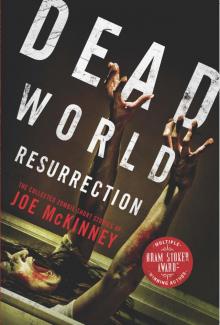 Dead World Resurrection
Dead World Resurrection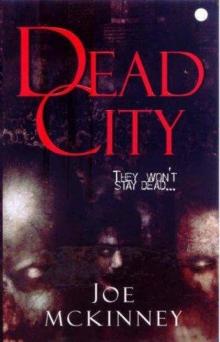 Dead City - 01
Dead City - 01 Flesh Eaters
Flesh Eaters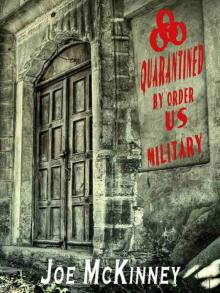 Quarantined
Quarantined Ultimate Undead Collection: The Zombie Apocalypse Best Sellers Boxed Set (10 Books)
Ultimate Undead Collection: The Zombie Apocalypse Best Sellers Boxed Set (10 Books)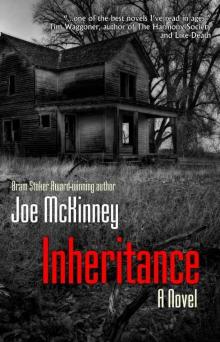 Inheritance
Inheritance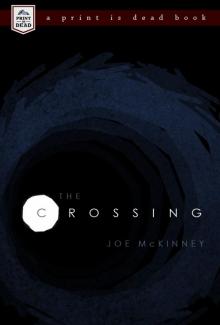 The Crossing: A Zombie Novella
The Crossing: A Zombie Novella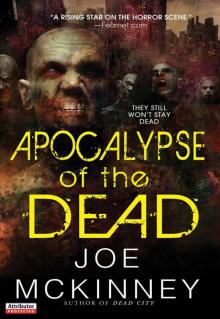 Apocalypse of the Dead
Apocalypse of the Dead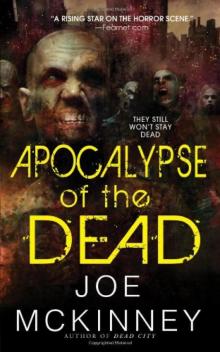 Apocalypse of the Dead - 02
Apocalypse of the Dead - 02 Flesh Eaters - 03
Flesh Eaters - 03 Mutated
Mutated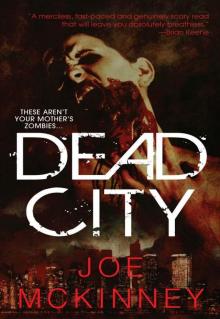 Dead City
Dead City Plague of the Undead
Plague of the Undead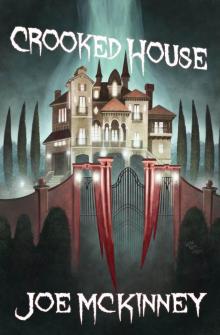 Crooked House
Crooked House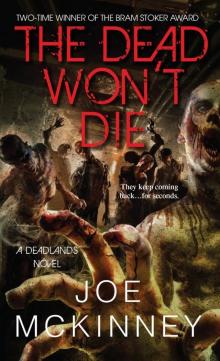 The Dead Won't Die
The Dead Won't Die